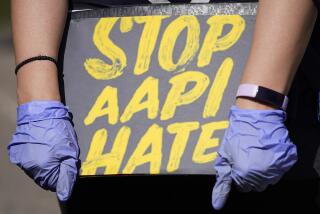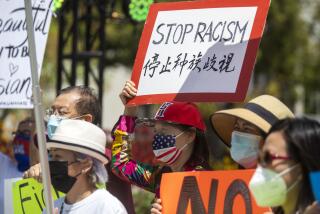Asians Battle Rights Abuses--in the U.S.
- Share via
Frustration, concern and anger are growing in Asian American communities across the country. The source of the concern is mounting evidence of human rights abuses, not in Asia but in the United States. Hate crimes and the treatment of scientists and engineers of Asian ancestry are changing Asian Americans in ways that may determine a new course of involvement and public discourse.
Hate-motivated killings have claimed eight Asian American lives in the past two years. In the latest incident, three Asian Americans, a Jewish American and an African American were killed in Pittsburgh on April 28. These hate-motivated killings have had a devastating effect on a broad cross-section of Asian Americans across the U.S., in part because the ethnic backgrounds of the victims have been so diverse, including South Asian, Filipino, Japanese, Korean, Vietnamese and Chinese. This horrible loss of life was for no apparent reason than the color of the victims’ skin and often their perceived immigrant status. It is an unprecedented number of hate killings of Asians since monitoring of such incidents began in the 1980s by the National Asian Pacific American Legal Consortium.
Further, the government’s concerted campaign against Los Alamos National Laboratory scientist Wen Ho Lee has especially stirred the Chinese American community. While his guilt or innocence is certainly open to inquiry, community leaders are united in the view that Lee has not received due process, may not receive a fair trial and that his incarceration in solitary confinement and without bail is an abuse of human rights.
Asian Americans have long borne the stereotype of the perpetual foreigner--the unwelcome immigrant or the disloyal or distrusted foreign agent. Japanese Americans bore the brunt of this during World War II as 120,000 were interned. Filipino World War 11 veterans have never received proper recognition and benefits for fighting bravely under U.S. command. When the 1996 campaign finance scandal implicated a handful of Asian Americans, thousands were investigated or stigmatized without cause. The recent hate crime wave and treatment of scientists are reminders of this ugly past.
New voices are being heard as Asian Americans speak out against these rights violations. Several families of victims have spoken out and rallied community members around prevention. The family of Joseph Ileto, the Filipino American postal worker killed in Chatsworth, has reached out to other victims in the Jewish, gay and lesbian, African American and Latino communities, and has advocated for the passage of the Hate Crimes Prevention Act. Community vigils, education efforts and pressure on political leaders to act have taken place.
Many others are organizing to ensure a fair trial and bail for Wen Ho Lee. Civil rights groups have been at work on a national day of outrage. New leadership has come forward, such as the Committee of 100, which is made up of prominent Chinese Americans. Scientists and engineers are starting to tell their own stories about intimidation and harassment due to their ethnicity. A respected professor has called for Asian American job applicants to boycott selected U.S. defense labs. An executive in space communications is so outraged at the treatment of Asian American scientists and engineers that he advised Asian Americans not to go into space or defense industries. With more than 20% of U.S. science and engineering PhDs being earned by students of Asian ancestry, such ideas could have dramatic consequences.
The country’s political leaders, especially in Congress, must not let their concerns about foreign policy justify a racially based witch hunt for alleged spies.
As Asian Americans of different ethnicities and economic strata are energized to deal with the loss of lives and liberties, their effectiveness in connecting to other Americans concerned about violence and racial profiling will be tested. What already has changed is that Asian Americans will no longer suffer in silence.
More to Read
Sign up for Essential California
The most important California stories and recommendations in your inbox every morning.
You may occasionally receive promotional content from the Los Angeles Times.










